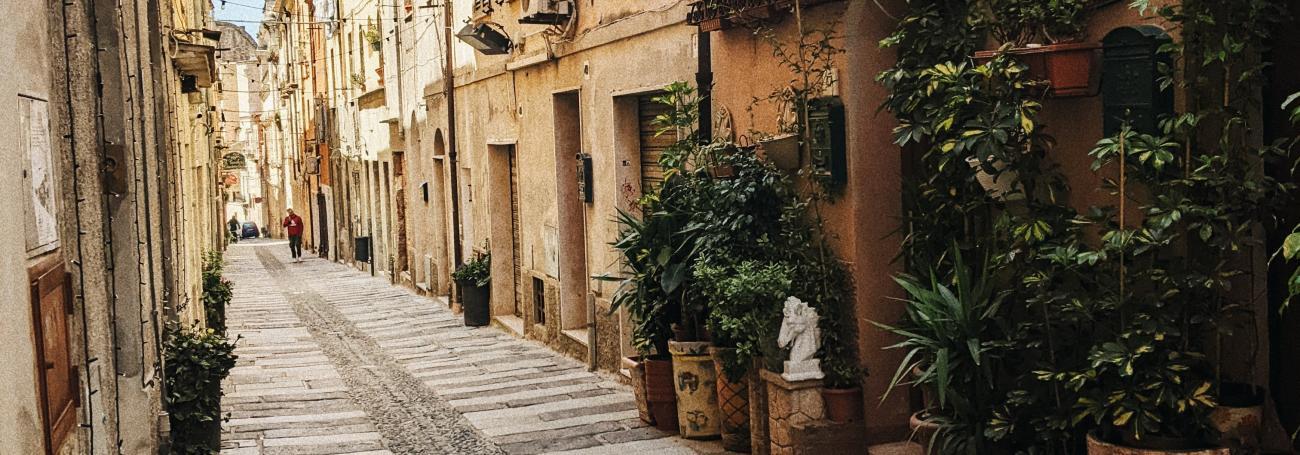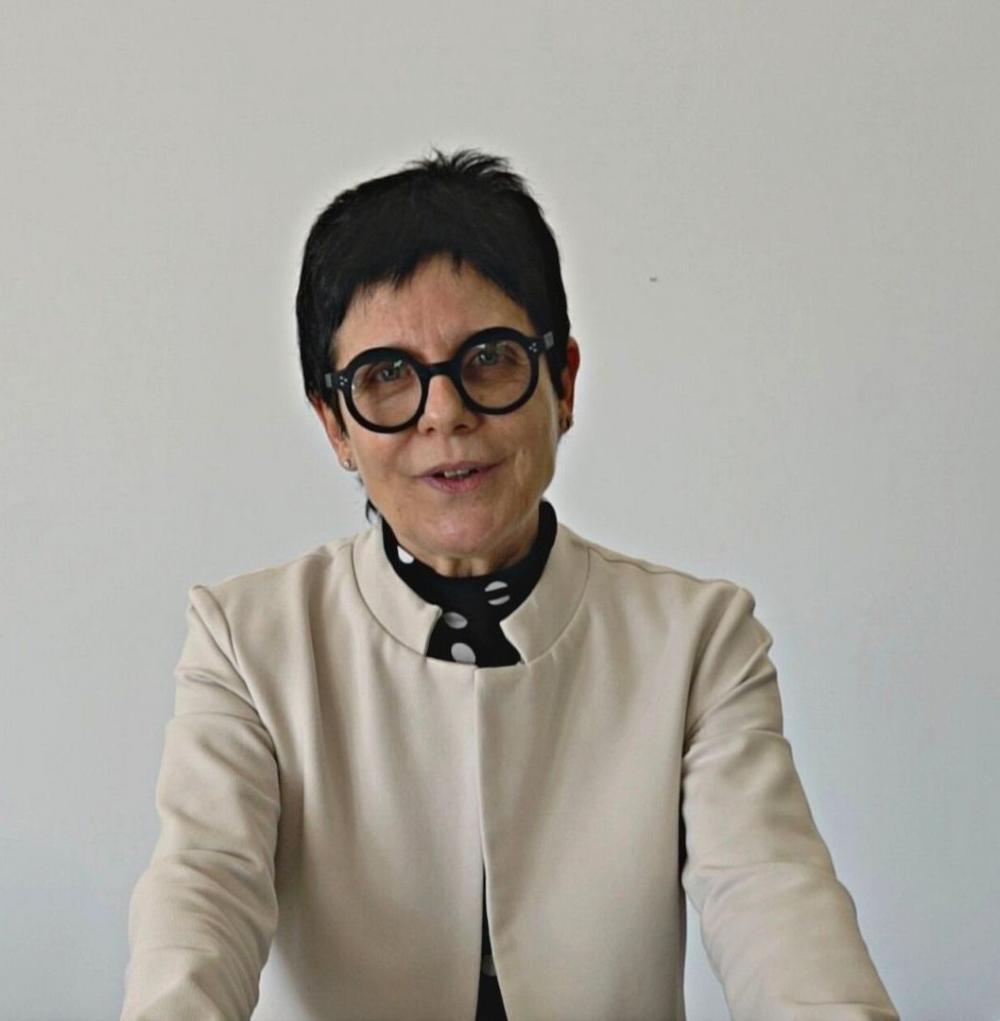
Professor Patrizia Patrizzi from the Team delle Pratiche di Giustizia Riparativa (Team of Restorative Justice Practices) of the University of Sassari , is co-organising the 11th EFRJ International Conference in Sassari.

Professor Patrizia Patrizzi from the Team delle Pratiche di Giustizia Riparativa (Team of Restorative Justice Practices) of the University of Sassari , is co-organising the 11th EFRJ International Conference in Sassari.
The interview was undertaken through emails by Claudia Christen-Schneider, as a part of the "Meet the keynote speakers" Blog series. You can read the interview with Giovanni Grandi here and the one with Robi Damelin and Layla Alsheikh here.

Sassari will host the conference this summer. Why choose Sassari as the venue for the conference? What is the link between Sassari and Sardinia in general in terms of restorative justice? Are there already any initiatives and if so, can you tell us more?
The choice of the venue for the biennial conference of the European Forum for Restorative Justice is the result of a participatory process. Every two years, the EFRJ launches a call to which everyone can participate by illustrating the elements for which they consider their own territory a suitable place to host this exceptional opportunity for meeting, and sharing between those in Europe and the rest of the world who support and spread restorative justice.
The Team delle Pratiche di Giustizia Riparativa (Team of Restorative Justice Practices) of the University of Sassari proposed ourselves, driven by the passion with which we have been working for years to spread the vision of restorative justice in Sardinia and on the national territory. We work to collect emerging concerns and support those already active, to build local communities with a restorative approach.
We also felt supported by the relevance and international impact of the restorative justice project that we started, in 2014, in Nuchis-Tempio Pausania. This started from a social conflict arising from the opening of a high security prison detaining people belonging to organised crime. We thus started a process of reparative conferences between prisoners and citizens. These meetings gave rise to other projects, in schools, with social services, for citizens. A municipal council was held in prison, the first in Italy, in which the figure of the municipal guarantor of persons deprived of their liberty was established. The municipality opened a restorative service and developed other projects inspired by the values of restorative justice. The President of the European Forum for Restorative Justice, Tim Chapman, has participated several times in the project actions. He defines our restorative actions addressed to the detainees, justice and social workers, police forces, students and citizens in Nuchis, as being in the forefront in the European panorama. Now, that community is recognised as 'Tempio Pausania restorative city'.
We proposed ourselves to host the Conference with the enthusiasm that characterises us, without hiding a fear! After the experience of Tirana, the venue of the Conference in 2018, our pressing question was that of the logistical capacity of Sassari, not a capital city, not a big city, but Sassari and Sardinia immediately agreed. Many institutions and friends are willing and collaborating because they believe in restorative justice and in the meaning of this event. The restorative justice group of Nuoro, the prisoners and their families, volunteers, citizens have sewn the bags for the Conference. Tempio Pausania is also preparing for the field trip on 25th June, which includes participation in a reparative conference at the prison of Nuchis and then a tour of the city, through the crucial places that have led to Tempio Pausania as a reparative city. The whole community is involved: in Sassari, in Tempio Pausania, in Nuoro, and across the regions. The ‘EFRJ Conference 2022’ is the result of everyone's work and contribution, as an entire community supports it in different ways. Everyone felt involved in welcoming the EFRJ community.
When did you first become aware of restorative justice and what initially attracted you to it?
I started working on restorative justice a few decades ago, when I did not yet have a structured role at university. I would say since the end of the 1980s. At that time I was working as a psychologist in the justice system (over the years with various functions: juvenile justice consultant - Juvenile Penal Institute, Staff Training School, Central Offices - expert at the Surveillance Court) and I was collaborating with Prof. Gaetano De Leo at the University "La Sapienza" (in the name of that time), my Master, my first inspirer of a divergent thought, aimed at change. I collaborated with him until 1996, when I started my official career at the University of Sassari, but our theoretical and applicative collaboration never stopped. We had joint projects. It was, therefore, in the framework of that collaboration that I started to be interested in the study of intervention models in juvenile justice, but also in ordinary justice.
Therefore, my first contact with restorative justice came from an offender-centric perspective. The encounter with restorative justice in the perspective of its three protagonists (offender, victim, community) followed in 2000. The work (both research and operational) always carried out in the social field and with minor victims also favoured it. The full encounter with the paradigm and with its applicability not only in the criminal field came a few years later: through the participation in the international debate, the discovery of the restorative cities and, therefore, of the different fields of application of restorative justice beyond the criminal. It is at that point that my two souls, that of the community legal psychologist and that of the psychotherapist, in an ever closer interaction with the perspectives of positive psychology, found the most fruitful place in which to express their complementarity.
The meeting with the EFRJ in the 2010 Conference in Bilbao, and then, with greater intensity, since 2017 as Board member, made me live closely, and intensely, the fullest sense of restorative justice, as a vision that includes, that brings together and does not separate, as a look at the human, as a tool for the well-being of people and their communities of life, as a way of life.
There has been much turmoil in Europe in recent months, from pandemics to war. Could restorative justice be used to address these problems? If so, how?
I firmly believe that restorative justice is powerful, transversal. Given the different seriousness of damages and conflicts, the same approach is needed to tackle and prevent them. "Un-do injustice", "Connecting people to restore just relations" are perspectives to be pursued immediately, from the very beginning: in the contexts of socialisation, in education, in organisations, in institutions, in all the places where people live, experience injustice, damage and suffering. It is a cultural issue that depends on the commitment of all of us, in our daily lives, in every situation. One cannot be indifferent; this is the key point. It is a question of changing perspective. If the focus of the problem shifts from the people (contexts, systems) to the damage generated, another reality is observed. Fighting people or fighting damage? Harm separates people, harm or the threat of harm can unite them: this is the key. I do not have a solution, but a perspective.
I was listening, a few days ago, to the words of our Italian Minister of Justice Marta Cartabia, who referred to restorative justice as a tool that can be used for any kind of conflict, that has a potentially boundless horizon, from school to war. I read John Braithwaite's recent article, and I am quoting a few passages from it because I am firmly convinced that we can all do something, in our own little world; let us think big, contaminating, in everyday life:
What do you want participants to take home from the Sassari conference?
I would like everyone to breathe the atmosphere of restorative justice and of the EFRJ, to bring with them the experience of being in connection with others. The conference will be an opportunity for discussion, learning and exchange of the experiences of each and every one in the different realities. I would like them to bring with them the enthusiasm of our Team delle Pratiche di Giustizia Riparativa of the University of Sassari (together with me: Gian Luigi Lepri, Ernesto Lodi, Maria Luisa Scarpa, Lucrezia Perrella), the words of the inmates of Nuchis, their reflections, their experiences also in terms of distancing themselves from the criminal organisation, their desire to give back to the younger generations; the enthusiasm of the high school students of Tempio Pausania who got to know restorative justice and immediately grasped its deepest meaning for their relational lives; the enthusiasm of the university students, the students of the Master in “Giustizia riparativa e mediazione. Per il benessere di persone e comunità” ("Restorative Justice and Mediation. For the well-being of individuals and communities"), all of them committed to a welcome that can transmit the convinced will of a change that is primarily cultural. I would like them to bring with them the sense of the human, transversal in the places where the conference will take place, where we will meet in the informality of the relationship, where we will meet experiences and community commitments: in Sassari, in Tempio Pausania, in Nuoro. I would like to breathe, all together, the restorative being. We are waiting for you!
Patrizia Patrizzi is member of the Board since June 2017. She is psychologist and psychotherapist, full professor of Psychology and Law, and Restorative Justice Practices at the University of Sassari. She collaborates with a team of restorative justice practitioners on a permanent basis in Italy, and they developed a model of restorative community named ‘Co.Re – community of restorative relationship’. In 2017 she established the Restorative Service of Psychological Counseling in the District of Tempio Pausania.
More info: www.psicoius.it / patrizi@uniss.it
Published on 18 June 2022.